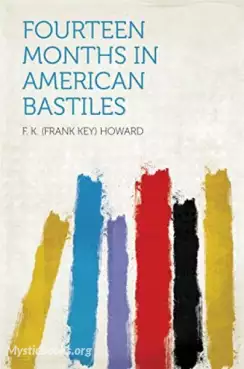
Timeline
Title
Country/Nationality
Francis Key Howard
Frank Key Howard was the grandson of Francis Scott Key and Revolutionary War colonel John Eager Howard. Howard was the editor of the Daily Exchange, a Baltimore newspaper sympathetic to the Confederacy. He was arrested without a warrant just after midnight on September 13, 1861 at his home by U.S. Major General Nathaniel Prentice Banks on the direct orders of General George B. McClellan enforcing the policy of President Abraham Lincoln. (In his book he writes that he was told by the arresting officer that the order had come from Secretary of State William Seward.) The basis for his arrest was for writing a critical editorial in his newspaper of Lincoln's suspension of the writ of habeas corpus, and criticizing the fact that the Lincoln administration had declared martial law in Baltimore and imprisoned without charge George William Brown, the mayor of Baltimore, sitting U.S. Congressman Henry May, all the police commissioners of Baltimore, and the entire city council. Lincoln's suspension of habeas corpus in Maryland had already been declared unconstitutional by U.S. Supreme Court Chief Justice Roger Taney (Howard's great-uncle by marriage) in Ex parte Merryman, but Lincoln had ignored the federal court ruling. Howard was initially confined to Fort McHenry, the same fort his grandfather Francis Scott Key saw withstand a British bombardment during the War of 1812, which inspired him to write "The Star-Spangled Banner", which would become the national anthem of the United States of America. He was then transferred first to Fort Lafayette in Lower New York Bay off the coast of Brooklyn, then Fort Warren in Boston.
Maryland was considered one of the five border states at the outbreak of the U.S. Civil War. On April 27, 1861 Lincoln suspended the writ of habeas corpus in Maryland partially as a response to the Baltimore riot of 1861, and in portions of midwestern states such as southern Indiana.
The first person to be arrested after this order was issued was Lieutenant John Merryman of the newly formed (1861) Baltimore County Horse Guards, a unit composed of southern sympathizers. Merryman was accused of treason for destroying bridges and telegraph wires to prevent Union troops from marching through Baltimore to reinforce Washington, D.C.
Lincoln's action was challenged in court and overturned by the U.S. Circuit Court in Maryland (led by Supreme Court Chief Justice Roger B. Taney, who was incidentally married to Anne Phoebe Charlton Key, Francis Scott Key's sister) in Ex Parte Merryman, 17 F. Cas. 144 (C.C.D. Md. 1861). Lincoln, citing the actions of prior U.S. President Andrew Jackson, chose to ignore the ruling. It was for criticizing Lincoln's actions in the editorial section of the Baltimore Exchange that Howard was arrested.
Books by Francis Key Howard

Fourteen Months in American Bastiles
Francis Key Howard recounts in this book his life as a political prisoner of the United States. He points out that he was held captive at the same location where his grandfather was inspired to write the national anthem about the "land of the free,"...